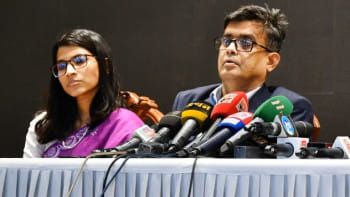Brokers urge DSE to act as primary regulator

Stockbrokers in Bangladesh have urged the Dhaka Stock Exchange (DSE) to regain its role as the primary authority in allowing initial public offerings (IPOs) and monitoring the country's share market.
This request came at a meeting between leaders of the DSE Brokers Association (DBA), the top 25 brokerage firms and the newly appointed DSE board at their office in Dhaka.
Saiful Islam, president of the DBA, said they asked the DSE board to empower the country's premier bourse so that it can play its due role just like those abroad.
He added that the DSE should become instrumental in approving IPOs to prevent weak companies from listing in the market.
Furthermore, Islam said rather than handling all market surveillance, the Bangladesh Securities and Exchange Commission should rely on the DSE to point out issues requiring its attention.
"The DSE has not been playing its proper role for the last 10 to 15 years," he added.
The stockbrokers also urged the DSE board to tell the government to reduce the taxes related to share trading as it would make the market more attractive for investors.
They said even though such a move may initially reduce government revenue, the overall tax collection would actually rise in the long-run as people would increase their investments and thereby pay more on share turnover.
A top official of a brokerage firm who was present at the meeting said they mainly stressed on reducing capital gains tax and other charges that are not investor friendly.
Capital gains are the profits investors make by selling shares. Over the past year, capital gains tax has gone from nil to 40.50 percent for general investors while it is 15 percent for institutional investors.
Neighbouring India charges investors a maximum capital gains tax of 15 percent, which reduces to 10 percent if the seller held the shares for more than one year.
Besides, the tax on dividend income is also 40.50 percent with the surcharge, which discourages sponsors from declaring good dividends.
In turn, investors are less likely to hold the shares after seeing that they offer poor returns, the broker said.
And unlike other businesses in Bangladesh, local brokers have to pay advance income tax of Tk 50 for every Tk 1 lakh worth of shares traded, which takes up about 20 percent of their revenue.
Meanwhile, brokers in India pay advance income tax of just Tk 5, the broker said.
Against this backdrop, the brokers the DSE to work on addressing these issues, he added.
The broker also suggested that the DSE or DBA should publish a white paper on offences that impacted the market over the past 15 years.


 For all latest news, follow The Daily Star's Google News channel.
For all latest news, follow The Daily Star's Google News channel. 



Comments